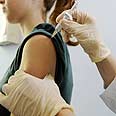
H1N1 vaccination
צילום: AP
47% of Israelis will not get vaccinated against swine flu
Poor publicity for swine flu vaccine make impact. New poll shows that 47% of Israelis not planning on getting vaccinated against H1N1 virus. Health Ministry: This figure is worrisome
About half of the population is not planning on getting vaccinated against the swine flu, according to a poll conducted by the Geocartography Institute on 500 respondents in October. The Health Ministry is slated to announce the start of their vaccination campaign Monday. The sick funds will start administering the vaccinations during the week.
The vaccination against the H1N1 virus, colloquially known as swine flu, has suffered until now from poor publicity. Some 23% of survey respondents said that they are certain they will get vaccinated, while 30% said they think they will. On the other hand, 21% of respondents said they don't think they will get the vaccination, and 23% said they are certain they will not get vaccinated.
Health Ministry: A worrisome figure
"This figure worries us a bit," said Yair Amikam, vice president of public relations in the ministry. "I understand there is some suspicion among the public towards the vaccine, which whose development process was completed rapidly, but as soon as it receives most of the authorizations, we would very much like the public to take the vaccine."
Amikam added that a Health Ministry-commissioned study performed in the middle of October produced an identical figure – 47% refusal to be vaccinated against the swine flu. Another poll taken two weeks ago, showed a consistent figure of about 50% of the public who are interested in being vaccinated.
The Health Ministry will launch a campaign to explain which high-risk groups are advised to get vaccinated and where they can receive the vaccination. "We will explain that there is no imminent risk and that the vaccination is entirely safe," said Amikam. "There are always those in opposition, and all that is left is to argue with them on the professional level."
The vaccination effort is slated to be rolled out this week. So far, 300,000 doses of the vaccine have arrived in Israel. A similar amount is slated to arrive within the next month.
Asked whether or not the number of those seeking to be vaccinated will exceed the number of available doses, Amikam said, "This scenario, I believe, will not come to be. I cannot imagine that will reach a situation in which we will say that the vaccines have run out."
The issues of the vaccination's safety and preparing for its distribution will be raised in Monday's discussion in the Knesset Health Committee at the behest of MK Dr. Arieh Eldad and MK Dr. Rachel Adatto.
According to Adatto, "The results are not surprising. The flu is a much easier illness than we expected it to be, and people are not rushing to receive a vaccination that has not been thoroughly tested. There is also some lack of clarity about the possible complications after receiving the vaccination.
"For instance, complications like Guillain–Barré syndrome, which occurs in one out of every 10,000 people who were vaccinated. It is unclear which populations are expected to be afflicted from this complication and whether they include children. I expect that one the Health Ministry director general published statistics on possible complications, the number of those declining vaccination will rise further."










